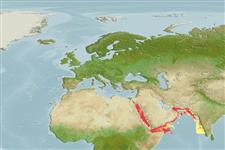Elasmobranchii (sharks and rays) >
Carcharhiniformes (Ground sharks) >
Triakidae (Houndsharks) > Galeorhininae
Etymology: Iago: Name of villain in Shakespeare’s Othello, because members of this genus have been a “troublemaker for systematists and hence a kind of villain”. (See ETYFish); omanensis: -ensis, Latin suffix denoting place: Gulf of Oman, type locality. (See ETYFish).
More on author: Norman.
Environment: milieu / climate zone / depth range / distribution range
Ecology
Marine; bathydemersal; depth range 110 - 2195 m (Ref. 244). Deep-water; 30°N - 10°N
Western Indian Ocean: Red Sea, Gulf of Aqaba (Ref. 9942) and Gulf of Oman to Pakistan and southwestern India. A low-finned, somewhat short-headed Iago is largely sympatric with Iago omanensis at least off southwestern India, and in the Bay of Bengal there is possibly a dwarf, omanensis-like Iago that may or may not be distinct.
Length at first maturity / Size / Weight / Age
Maturity: Lm 55.7 range ? - ? cm
Max length : 37.0 cm TL male/unsexed; (Ref. 244); 58.0 cm TL (female)
Brown or grey dorsally, lighter below; dorsal and caudal fins may have darker tips and leading edges (Ref. 5485).
Found on the continental shelf and slope. Water temperature: 16-25°C. Oxygen level: 0.2-2.4 ppm. Feeds on bony fishes (mostly lanternfishes) and cephalopods. Sexual dimorphism by size exists. Viviparous (with a yolk-sac placenta), with probably 2 to 10 young in a litter. Utilized fresh for human consumption.
Viviparous, placental (Ref. 50449). Distinct pairing with embrace (Ref. 205).
Compagno, L.J.V., 1984. FAO Species Catalogue. Vol. 4. Sharks of the world. An annotated and illustrated catalogue of shark species known to date. Part 2 - Carcharhiniformes. FAO Fish. Synop. 125(4/2):251-655. Rome: FAO. (Ref. 244)
IUCN Red List Status (Ref. 130435)
Threat to humans
Harmless
Human uses
Fisheries: subsistence fisheries
Tools
Special reports
Download XML
Internet sources
Estimates based on models
Preferred temperature (Ref.
123201): 10 - 21.7, mean 14.6 °C (based on 100 cells).
Phylogenetic diversity index (Ref.
82804): PD
50 = 0.7500 [Uniqueness, from 0.5 = low to 2.0 = high].
Bayesian length-weight: a=0.00427 (0.00183 - 0.00992), b=3.04 (2.83 - 3.25), in cm total length, based on LWR estimates for this (Sub)family-body shape (Ref.
93245).
Trophic level (Ref.
69278): 4.2 ±0.3 se; based on diet studies.
Resilience (Ref.
120179): Very Low, minimum population doubling time more than 14 years (K=0.48; Fec=2).
Fishing Vulnerability (Ref.
59153): Moderate vulnerability (43 of 100).
